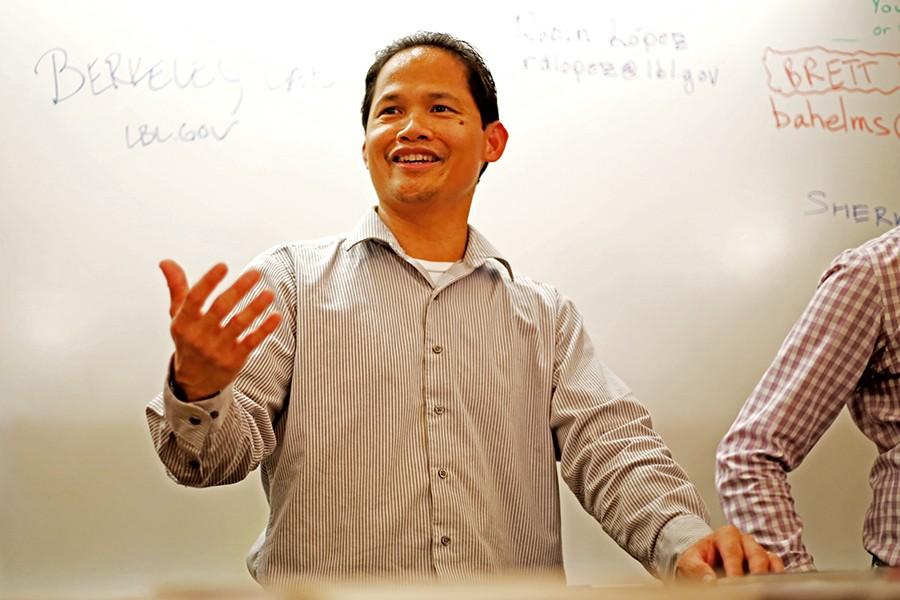Berkeley Lab offers paid technical internships
Center for Science Excellence hosts open panel for 2016 programs
Lawrence Berkeley National Laboratory Facilities Mechanical Engineer Sherwin Mendoza encourages students to join the summer internship program during the panel discussion in PS-132 on Friday.
Oct 13, 2015
Lawrence Berkeley National Laboratory is offering community college and undergraduate students an opportunity to work as a paid intern during the 2016 spring, summer or fall semesters.
The Center for Science Excellence invited three Berkeley Lab employees to host an open panel at Contra Costa College on Friday in PS-132 from 2 to 5 p.m.
Berkeley Lab employees at the open panel encouraged STEM majors to apply for a paid summer internship before the Jan. 8, 2016 deadline. The application deadline for the spring semester has passed.
“Who is ready to change the world and get paid?” Berkeley Lab Internship Program Manager Colette Flood said to begin the open panel discussion. “All of our intern students are paid $500 a week. An opportunity like this is hard to find.”
The online application process for the 10-week summer internship at the Berkeley Lab opens on Thursday for both community college students and other undergraduates.
The internship for next fall, however, is a 16-week program and its online application opens on March 14, 2016.
Flood said that the fall internship is geared toward students who are transferring to four-year universities and want to do scientific research.
She said for community college students who sign up for the summer internship they will mainly focus on gaining technical experiences and exploring technical careers.
Berkeley Lab Scientific Researcher and Civil Engineer Robin Lopez said, “When I started as a student at CCC, I was indecisive about my major. It was after I joined the Berkeley Lab that I was able to find out what it is that I wanted to do.”
Toward the end of the presentation he said, “Do not let the fact that you are at community college discourage you from applying (for an internship).”
He then recalled his time as a “hood boy” living in Richmond and how becoming a student at CCC changed his life.
“I did stupid stuff back then and didn’t take my education seriously. Now, I’m in charge of my destiny, and I am currently working on a climate research project.
“My mom is really proud of me. Even though I’m aiming for senior science level in the (Berkeley) lab — my heart is still with those (community college) intern students.”
Students were encouraged to ask questions.
“I really enjoyed the meeting,” undecided major Iris Wong said. “It exposed us to many opportunities for success. I also think it was amazing to bring (Lopez), as he was a CCC student. He is an inspiration for many CCC students seeking (science) internships.”
Flood expects the first weeks of summer for student interns to be “intense, fast and furious.” She said students are expected to catalog about 40 hours a week in the lab. “It is considered a full-time job.”
“I would not recommend that students in the internship take other classes,” she said. “They will be doing many things in the lab, such as writing research papers and doing presentations on their research project.”
Berkeley Lab also gives community college students the opportunity to pair with experienced scientists in the lab to help them build science, engineering and technology skills.
“The relationship established between the student and the mentor is important,” Berkeley Lab Principal Investigator Brett Helms said. “My job as a mentor is to promote students to the next level. I take (community college) and (undergraduate) intern students and try to develop programs that will help them learn about things such as electricity, or renewable energy resources.”
Helms said the faculty mentor must be an expert in the same field of study as the student.
Berkeley Lab mechanical engineer Sherwin Mendoza said, “If you are a mechanical engineer major then you will most likely be paired with a mechanical engineer. It doesn’t have to be specific, as long as it’s in the engineering discipline.”
Flood said joining professional organizations before applying for summer internships is also important.
“When considering candidates for internship programs, we look for how you are engaged in your discipline,” she said. “Professional organizations help you build your network.”
Helms said, “I will also look for (application) essays that stand out. There are collections of things I review. It’s actually tough to connect with potential students if they are interested in a broad major such as structural biology.”


